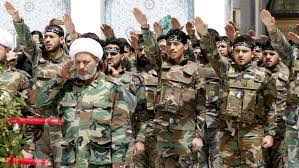Syria Militias Stay Alert Amid Ceasefire Doubts
On June 24, a new layer of complexity emerged in the Middle East conflict as Syrian-based, Iranian-aligned militias significantly elevated their state of operational readiness. Analysts monitoring developments in the region reported that groups such as Liwa Fatemiyoun and other Iran-backed factions in Syria's eastern Deir ez-Zor province have taken clear steps to signal preparedness for renewed hostilities, should the recently brokered ceasefire between Israel and Iran falter.
The heightened posture includes the deployment of mobile air-defense systems, repositioning of ground forces, and installation of dummy missile launchers to mislead aerial surveillance. Satellite imagery and field reports confirm increased activity across militia-controlled zones, reinforcing concerns that these proxy forces could open a new front in the conflict.
This strategic posturing comes days after U.S. President Donald Trump announced a tentative ceasefire between Israel and Iran following nearly two weeks of intense exchanges. The Geneva talks that preceded the truce are ongoing, yet observers now warn that Tehran appears to be keeping its options open by shoring up regional influence, particularly through loyalist militias in Syria.
While some Syrian factions are projecting a commitment to peace—setting up temporary medical aid stations, offering symbolic support for diplomacy, and issuing calls for calm—others maintain a covert militarized stance. Intelligence sources suggest that despite public claims of defensive intentions, many of these groups remain in close coordination with the Syrian government in Damascus, under direct or indirect supervision by the Islamic Revolutionary Guard Corps (IRGC).
A spokesperson affiliated with Hezbollah in Syria claimed that the build-up is purely precautionary and part of a deterrence strategy, but regional experts caution that these preparations could be interpreted as a provocation or a readiness to act should ceasefire violations occur. The Assad regime, for its part, has tightened restrictions on foreign journalists operating in eastern Syria and has reinforced military checkpoints near militia encampments, likely in a bid to retain control over narrative and movement in contested zones.
UN humanitarian agencies operating in Syria have voiced concern that renewed military activity around populated areas may lead to further displacement. Local resident groups from villages near Deir ez-Zor report growing unease as militia convoys pass through civilian areas and fortifications are being hastily constructed in surrounding fields. These developments point to a possible return to instability in regions that had seen relative quiet in recent months.
Political analysts argue that if the Geneva-led peace effort falters, Syria is likely to become a secondary battlefield. Tehran, they suggest, could exploit the fragmented nature of the Syrian conflict to apply pressure on Israel without engaging in direct combat. This tactic allows Iran to maintain plausible deniability while still leveraging asymmetric threats through its network of regional proxies.
European Union and U.S. diplomatic circles have already begun to draft potential policy responses aimed at deterring these proxy escalations. Sources indicate that discussions at upcoming Vienna security talks may include attempts to establish indirect ceasefire obligations for militia groups affiliated with foreign actors. However, enforcement mechanisms for such agreements remain weak and would rely heavily on ground-level monitoring and intelligence-sharing.
Despite the military tension on the Syrian front, global markets have so far remained largely unaffected. Oil prices, equity indices, and foreign exchange markets continue to be influenced primarily by broader expectations surrounding the Israel-Iran ceasefire and diplomatic progress in Geneva. Nevertheless, security experts warn that any significant flare-up in Syria could quickly alter investor sentiment and reignite concerns over regional energy infrastructure vulnerabilities.
In essence, Syria's evolving role in the Israel-Iran conflict exemplifies the multilayered nature of Middle Eastern geopolitics. The country, still reeling from over a decade of civil war, now faces renewed instability—not necessarily from internal divisions, but as a potential proxy battleground. The next few days will be pivotal, as diplomacy seeks to hold back the tides of war, and the world watches to see whether these heavily armed militias remain in defensive posture or become active agents in a broader regional conflict.
News Source: https://www.reuters.com/world/middle-east/iran-backed-militias-active-syria-geneva-talks-2025-06-24/








